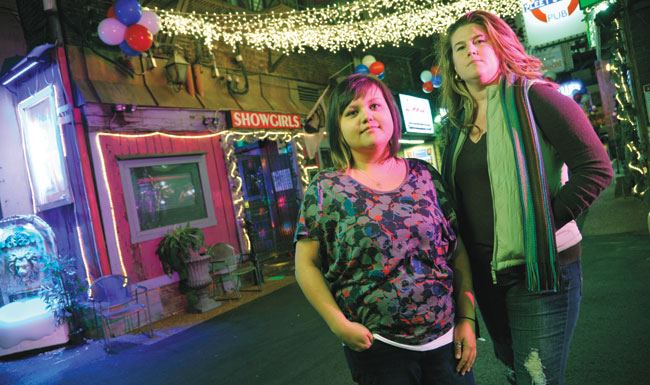
A professor at Peabody once said in class that research is advocacy just as much as handing out a pamphlet is advocacy. On May 26, 2011, we both saw our research turned into advocacy on a scale that few graduate student researchers ever get to experience.
When either of us tells someone the subject we have spent many hours researching and writing about, a puzzled look often appears. For when you bring the issue of human sex trafficking into a conversation, you can’t just brush that aside and then talk about the weather. Some questions that immediately follow include:
Slavery still exists? Sure, maybe at a small scale and in the deepest darkest depths of impoverished countries, or in the backyards of lunatics. But widespread? And that doesn’t happen in the United States, right?
Sex trafficking is a problem that few people want to talk about because everyone thinks that it’s an issue “over there.” It is not, and we were given a great opportunity to work with the Tennessee Bureau of Investigation (TBI) to help prove that it not only happens in the United States, but it also happens in our own backyard.
Jill began researching the topic eight years ago when she first heard about it and was just as perplexed about its existence as many people still are today. She spent much of her master’s program researching the issue and did her thesis on public perceptions of human trafficking in Moldova. Nicole became aware of the issue during her undergraduate study and spent most of her graduate program looking at the issue as it occurs in the United States. She is passionate about the issue as it occurs in the United States, because there are so few resources available for victims to fully recover, largely because people don’t believe it occurs here. For both of us, it is an ultimate form of injustice for one human to exploit and deny the freedom of another.
“For both of us, it is an ultimate form of injustice for one human to exploit and deny the freedom of another.”
—Nicole Garcia and Jill Robinson
In the fall of 2010, we were contacted by the TBI to consult on a statewide survey to determine the extent of human sex trafficking in the state. We used the federal definition of human sex trafficking, which is “a for-profit sex act that is induced by force, fraud or coercion OR in which the person performing such an act is under the age of 18 years.” Awareness of the issue has grown nationally and locally, thus prompting the state legislature to pass Public Chapter Number 1023, in order to “study human sex trafficking, the improvements that should be made to existing laws relative to human sex trafficking and the impact of human sex trafficking on children and youth in this state. …”
Throughout several meetings we worked with the TBI in the role of academic researchers to assist with the creation of the survey as well as help edit pieces of the report. The TBI sent out the survey to representatives from law enforcement, social service agencies, district attorneys’ offices and guardian ad-litems. When the surveys were completed, we met again as a team to go through results and organize the report. We were able to contribute our past research experiences to add a literature review for the study. We also compiled a list of non-profit organizations statewide that provide education about and services for victims of human trafficking. The study was released with results that surprised many, showing that there is a great deal of human sex trafficking of both adults and minors in Tennessee. Just a few short weeks after the report was released, the Tennessee legislature revisited the issue, passing HB35/SB64 and HB154/SB69. Essentially, these bills changed state law so that the penalties for the promotion and solicitation of juvenile prostitution are tougher.
 It was a pretty easy sell. The sexual exploitation of kids is obviously wrong, however, one of our legislative victories was the decriminalization of juvenile prostitutes. That has created a new challenge. If minors are not held in any kind of custody, where do they go? Presently there are few resources to help victims of human trafficking recover, thus creating a system within which they often return to their pimp/trafficker or the situation that made them vulnerable in the first place. Furthermore, adult victims of sex trafficking were not included in the new legislation. That’s a tougher sell, because of the competing public perceptions of adult prostitution.
It was a pretty easy sell. The sexual exploitation of kids is obviously wrong, however, one of our legislative victories was the decriminalization of juvenile prostitutes. That has created a new challenge. If minors are not held in any kind of custody, where do they go? Presently there are few resources to help victims of human trafficking recover, thus creating a system within which they often return to their pimp/trafficker or the situation that made them vulnerable in the first place. Furthermore, adult victims of sex trafficking were not included in the new legislation. That’s a tougher sell, because of the competing public perceptions of adult prostitution.
Being a part of a major policy change, especially when it comes to changing state law, feels like a career highlight for us action-oriented researchers. It is satisfying to know that the work we put in contributed to a change that is intended to combat, or at least mitigate, a particularly sinister injustice. However, when the dust settles, and the adrenaline has stopped pumping, we are faced with the unintended consequences of our good intentions. Our next challenge? After being a part of this policy change, where do we go from here?